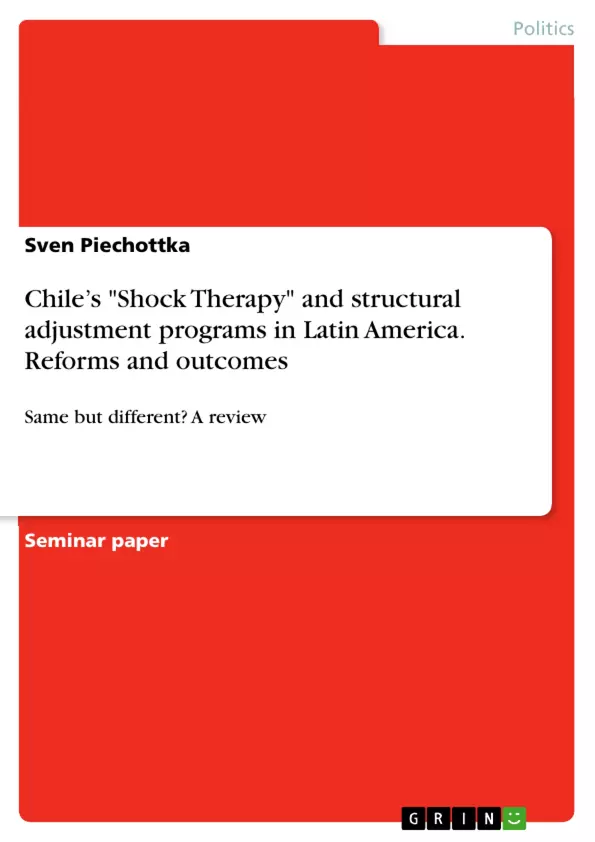In this short paper, I followed a comparative case study approach to explore the reforms and reform outcomes in four different Latin-American countries during the 1980s.
I chose Chile as a successful example of structural adjustment politics and Bolivia, Peru and Argentina as deviating cases to evaluate different reform success. My findings supported a case-by-case evaluation. It turned out that orthodox structural adjustment policies were implemented differently in every country due to country-specific political, historical and institutional features as well as an altering relationship to international financing institutions.
Generally, orthodox reforms seemed to back economic stabilization but not necessarily structural economic adjustment. A review of the current state of literature showed differing explanations for varying reform success. While some researchers attribute failure to heterodox deviation, others see a too orthodox course or suggest an explanation by inappropriate time and place for the reforms. Further research will be needed to clarify causalities. It is suggested to put a stronger focus on underlying context-dependent reform drivers and stumbling blocks.
Inhaltsverzeichnis (Table of Contents)
- Introduction
- Brief Historical Perspective on Neoliberalism
- Structural Adjustment Programs and their Critique
- The Chilean Regime of Neoliberalism
- Radical Reform Period 1975 – 1983
- Pragmatic Neoliberalism 1983 – 1990
- Evaluation: The Current State of Literature
- The Case of Peru
- The Case of Bolivia
- The Case of Argentina
- Discussion
Zielsetzung und Themenschwerpunkte (Objectives and Key Themes)
The purpose of this paper is to compare neoliberal reforms implemented in Chile and other Latin American countries, specifically Peru, Bolivia, and Argentina. It aims to identify commonalities in these reform initiatives and assess their outcomes based on existing literature. The paper intends to provide a clearer picture of the interaction between neoliberal reforms and their consequences, as well as the cross-country comparability of these reforms in the Latin American context.
- Comparison of neoliberal reforms in Chile and other Latin American countries
- Analysis of commonalities in reform initiatives
- Assessment of the outcomes of these reforms
- Exploration of cross-country comparability of neoliberal reforms in Latin America
- Review of existing literature on the impact of neoliberal reforms
Zusammenfassung der Kapitel (Chapter Summaries)
- Introduction: This chapter provides a historical context for the study, introducing key terms and outlining the research objectives.
- Brief Historical Perspective on Neoliberalism: This section traces the origins of neoliberalism, emphasizing its origins in the Austrian and Chicago Schools of economics and its influence on policymaking in the 1980s.
- Structural Adjustment Programs and their Critique: This section examines the emergence of Structural Adjustment Programs (SAPs) in the 1970s and their goals, focusing on the role of the International Monetary Fund (IMF) and the World Bank (WB) in implementing these programs.
- The Chilean Regime of Neoliberalism: This chapter explores the implementation of neoliberal reforms in Chile, highlighting the “Chicago Boys” and their role in the “great transformation” of the Chilean economy.
- The Case of Peru: This chapter analyzes the implementation of neoliberal reforms in Peru, examining the specific features and outcomes of SAPs in this context.
- The Case of Bolivia: This chapter presents an analysis of neoliberal reforms in Bolivia, focusing on the specific challenges and successes of SAPs in this country.
- The Case of Argentina: This chapter examines the experience of neoliberal reforms in Argentina, exploring the specific context and the outcomes of these programs.
Schlüsselwörter (Keywords)
The primary focus of this paper lies in the analysis of neoliberal reforms and their impact on Latin American economies. Key themes include structural adjustment programs, the Chicago Boys, economic stabilization, economic adjustment, and the Washington Consensus. The paper also explores the influence of political, historical, and institutional factors on the success or failure of these reforms in different countries.
Frequently Asked Questions
What was Chile's "Shock Therapy" in the 1970s?
It refers to radical neoliberal reforms implemented by the "Chicago Boys," focusing on deregulation, privatization, and drastic cuts in government spending.
How did neoliberal reforms differ across Latin American countries?
The study compares Chile, Bolivia, Peru, and Argentina, showing that reforms were implemented differently based on country-specific political and historical contexts.
What are Structural Adjustment Programs (SAPs)?
SAPs are economic policies for developing countries promoted by the IMF and World Bank to encourage economic stabilization and market liberalization.
Were the orthodox reforms successful in Latin America?
Findings suggest that while reforms often helped economic stabilization, they did not necessarily lead to long-term structural economic adjustment in all cases.
What is the "Washington Consensus"?
It is a set of ten economic policy prescriptions considered the standard reform package for crisis-wracked developing countries in the 1980s and 90s.
- Quote paper
- Sven Piechottka (Author), 2017, Chile’s "Shock Therapy" and structural adjustment programs in Latin America. Reforms and outcomes, Munich, GRIN Verlag, https://www.grin.com/document/374959



